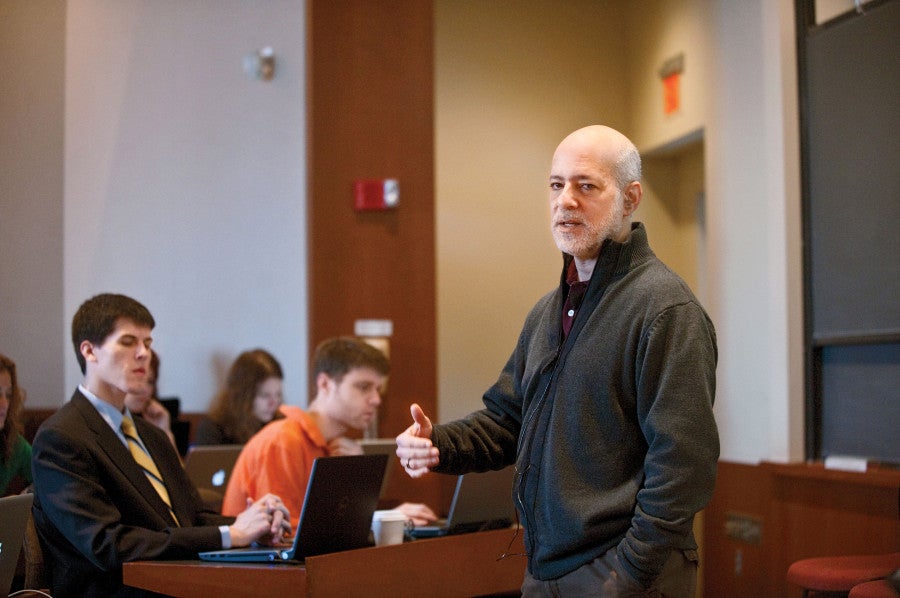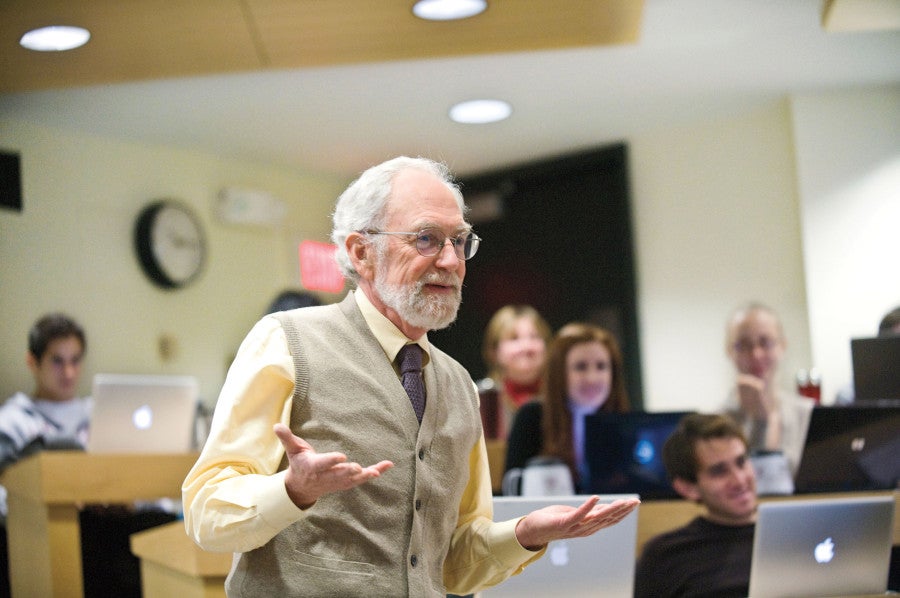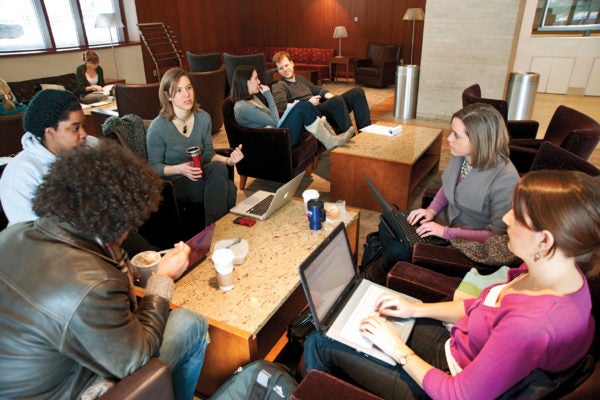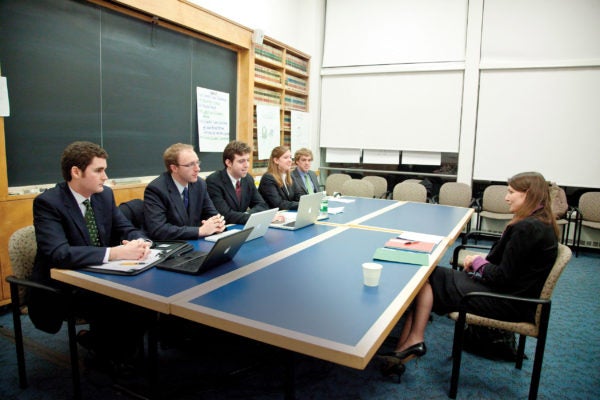A first-of-its-kind problem-solving workshop prepares 1Ls for the realities of law practice

Professor Joseph Singer ’81
It’s a January morning at Harvard Law School, and in a classroom in Pound Hall, a revolution in legal education is underway.
Eighty 1Ls watch as a classmate, Christina Cruz Chinloy ’12, interviews a middle-aged female “client” in a simulated case of wrongful termination, in the Law School’s new Problem Solving Workshop. “I understand how you feel slighted,” says Chinloy, her voice sympathetic as she leans forward, seeking information to build the case.
[pull-content content=”
Professor Todd Rakoff ’75, co-creator of the workshop—which launched this year as a mandatory winter term course for first-year HLS students—stops the interaction. “Client, how’s it going?” he asks Janet Katz, an HLS librarian playing the client role.
“No one so far has said, ‘Here are your options,’” Katz replies. “No one has asked me, ‘If you could go back to your old job, would you?’” And one student, she notes, dodged her question about legal fees.
A few more students try their hand at the exercise before Harry T. Daniels, a partner at WilmerHale, steps in to show students how he would proceed, including presenting the client with options: Take the severance package? Leverage questionable behavior at the company so it will void the client’s non-compete agreement?
Team approach gets high grade from students
After the first semester of law school—including standing alone under the Socratic spotlight—one of the best aspects of the new Problem Solving Workshop in winter term is learning to rely on classmates while teaming up to resolve complex legal issues, students say.
Read More
The class is clearly impressed with Daniels. “The biggest difference was the authority with which he spoke, not only on the law, but in saying, ‘This is what I’ll do for you,’” says Chinloy.

Professor Todd Rakoff ’75, co-creator of the Problem Solving Workshop Credit: Jon Chase
Rakoff praises the students for their efforts. After all, the members of the class of 2012 are pioneers, the first to take this new course that emphasizes practical skills, creative thinking, and exercising judgment (the course was tested on upperclassmen over the past two years). Mock client interviews, group brainstorming, decision trees, interactions with practicing attorneys—even how to write an effective e-mail and deal with the media—are not the traditional tools of American legal education, which, for 150 years, has relied more on analysis of appellate case law. And that’s precisely the point.
The Problem Solving Workshop puts students in the position of real-life attorneys. Over a three-week period, it presents them with seven very different clients, from a multinational corporation with child-labor issues to a tenant facing eviction after the landlord has lost her home in foreclosure.
Working in teams, the students start each case from the very beginning – when the client walks in the door – and gather facts, help the client figure out short- and long-term goals, devise a range of possible options, guide the client in weighing those choices, and negotiate with other parties.
This bottom-up approach mirrors what students will face in practice, and is an essential part of equipping them with tools they need to succeed in today’s legal world, HLS faculty believe. Curricular reforms voted by faculty in 2006, and designed by a team led by now-Dean Martha Minow and championed by then-Dean Elena Kagan ’86, also added international and legislative and regulation courses for 1Ls. But the Problem Solving Workshop is the most striking departure from standard legal pedagogy—and it’s won passionate advocates.

Working in teams, students take each case from the very beginning, brainstorming and discussing strategy.
“I think this is the most exciting thing not only that we have done, but that any law school has done in a long time,” says David Wilkins ’80, professor of law and director of the Program on the Legal Profession at HLS. He is one of seven instructors who taught the workshop this winter. “I think it’s radical. I think just as HLS made its mark on legal education almost two centuries ago, with the case method and Langdell, I think this could have an equally transformative effect.”
In addition to Rakoff and Wilkins, three other HLS faculty—John Palfrey ‘01, Joseph Singer ’81, and Howell Jackson J.D. M.B.A. ’82—taught sections of the workshop, as did Gillian Hadfield, a visiting professor from the University of Southern California, and William Lee, litigator and co-managing partner of Wilmer Hale. Relying on materials developed primarily by Rakoff and Singer, the instructors worked in close collaboration, meeting each day after class to compare what worked and to tweak the next day’s presentations. The workshop is seen as a bridge to HLS’s clinical program, and HLS clinical faculty including Esme Caramello, deputy director of the Harvard Legal Aid Bureau, participated in presentations David Grossman, clinical professor of law and Director of the Harvard Legal Aid Bureau, helped develop the course materials, and Wendy Jacobs, director of the Environmental Law and Policy Clinic, also assisted and will be teaching a section of the workshop next year.

Deborah Lloyd, manager and senior counsel, General Electric (on right side of table), playing the role of managing attorney, listens to a presentation from (left to right) 1Ls Jason Gelbort, Daniel Cluchey, Steve Henrick, Martha McCoy, Christopher Mills.
David Zucker ’12 says the course was “most valuable in the ways it was different from the ‘typical’ law school class”; instead of individual reading followed by professor-led class discussion, the workshop involved “hands-on engagement with the legal issues presented” through client interviews and class-wide debates. Zucker learned the most from interactions with practicing attorneys, including the final exercise, in which the entire 1L class traveled in small groups to various Boston law firms to discuss a project with experienced lawyers. “I found that oftentimes an approach that may be suggested during a theoretical class discussion is not one that a practicing attorney would ever really employ; likewise, I discovered recommendations from the practicing attorneys that had never been discussed in class,” Zucker says.
The workshop has drawn intense interest, with many other law schools contacting Dean Minow and the workshop’s instructors. And law firms – including WilmerHale and other Boston firms that donated attorney time to help instruct students – are excited by a new model that seeks to better equip young lawyers to practice law. Lee, whose experience as a litigator and co-managing partner of a major law firm were especially valuable to the workshop, according to the other instructors, said: “Without a doubt, I am 100 percent convinced that other law schools should adopt this because it offers a set of skills that lawyers need in the real world.”
Says Wilkins, “The general counsel of a Fortune 25 company said to me, ‘This is exactly what I wish I’d learned – and what I want my attorneys to know about.’”
Teaching real-life lawyering—ambiguities and all
Law schools have long taught students to “think like lawyers” and to develop analytic skills through the study of case law. But practicing lawyers today depend on a variety of skills beyond the ones typically emphasized in law school curricula. Equipping students with additional skills—including generating creative options, managing media relations, negotiating and working in teams—is the purpose of HLS’s new Problem Solving Workshop.
Professor Joseph Singer ’81 spent the past two years developing the workshop with Todd Rakoff ’75 and testing it on upper-class students. Instead of looking at a case at its end point—an appeals court decision—the workshop presents cases that begin with the initial contact between lawyer and client. “The students improved radically over the three weeks in their abilities to generate workable solutions, drawing on theories, facts, interests, ethics and relationships,” Singer says.
The purpose of the workshop, adds Singer, “is to put students in a very practical setting, of learning how to help clients achieve their goals within the bounds of the law and ethics.” He sees it as an essential part of 1L orientation, supplementing the technical skills students learn in regular courses with an emphasis on common sense, judgment, even wisdom. It also stresses that in real life, unlike in casebooks, ambiguities abound—in the law, in the facts, in what a client wants or thinks he wants.
HLS’s clinical program—the most extensive in the world—enables students to represent clients in real cases under the guidance of practicing attorneys. In a similar vein, the workshop gives students a framework for approaching problems based on key questions: Who is the client? What are the client’s goals? What facts need to be discovered? What laws are relevant, leading to what constraints and opportunities? What options can be generated to solve the client’s problem?
“It’s the most fulfilling teaching I’ve ever done,” says Professor John Palfrey ’01. “I think we have, in the Problem Solving Workshop, a real opportunity to find better ways to prepare students to become lawyers.”” float=”center”]